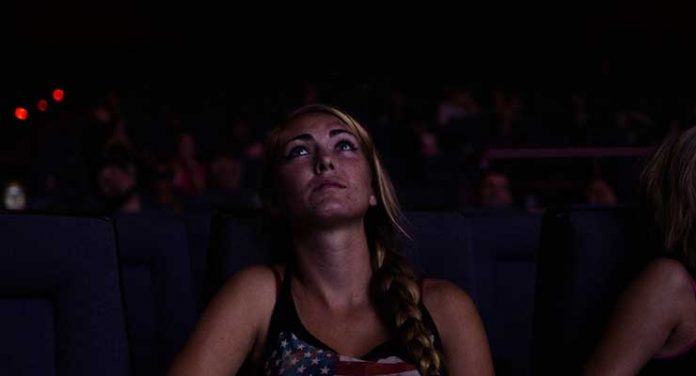
A young man (Robert Jumper) is pacing off steps from his car in a shopping center parking lot to what turns out to be a building housing several movie theaters. Completely unnoticed, Robert subsequently walks through his neighborhood, casually toting an assault rifle. Later, he tries on a series of fright masks that he checks out on his bedroom mirror. Watching an Army veteran cleaning his extensive rifle collection provides further hints on things to come. The rather quiet background is suddenly punctuated with sounds of live gunfire at a local target practice range. If all of these hints were not sufficient, Robert visits a friend’s house where a prominently displayed picture of Ronald Reagan (who survived a shooting) implicitly tells viewers that the central theme of Dark Night is going to be that of gun violence in America.
[envira-album id=”97261″]
The indie film community has consistently recognized writer/director Sutton and, Dark Night received three best film nominations at international film festivals. Sutton has a knack of taking little known and mostly nonprofessional actors like Robert Jumper, Karina Macias, Aaron Purvis, and Rosie Rodriguez and melding them into an ensemble of true-to-life characters that lend credibility to the events portrayed in this film. Veteran French cinematographer Hélène Louvart gets her cameras to capture the commonplace details of everyday American life, give us a good sense of place, and couch the action in a cinéma-vérité style. Maica Armata is a Canadian singer/songwriter, musician, and actress whose first film score is deliberately low-key and offers little if any indication of what is about to happen. Sutton builds this film’s tension very deliberately and, much to my surprise, it did not entirely provide the finale that I had been anticipating. Gun violence remains a significant problem in our country and although this film does not provide viewers with any solutions, it does highlight the all too frequent problem of disturbed young people who are able to get access to deadly weapons. Avoiding heavy-handedness, Dark Night is one of the better treatments of this subject that I have seen in quite some time.
Dark Night opens at the Alamo Drafthouse in Brooklyn, NY February 3, 2017 and in Los Angeles, CA February 9.
httpss://vimeo.com/196521618
Be the first to leave a review.

